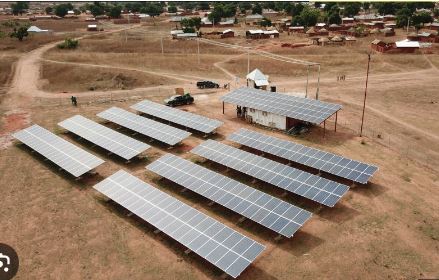The Nigerian Federal Government has announced an increased deployment of mini-grids in rural communities to bolster power supply and mitigate the impact of the recent removal of subsidy on Premium Motor Spirit (petrol). In a statement released by the Rural Electrification Agency (REA) on Sunday, it was revealed that these mini-grids would provide round-the-clock electricity to the communities where they are deployed.
The Managing Director of REA, Ahmed Salihijo, recently inspected a 200KWp Solar Hybrid Mini-Grid in Danchitagi Community, located in the Lavun Local Government Area of Niger State. Salihijo emphasized that these mini-grids, including the one in Danchitagi Community, would help reduce the amount of petrol purchased by the beneficiaries in the community.
Through the Nigeria Electrification Project-Performance Based Grant initiative, more than 80 similar mini-grids have already been deployed across the country, ensuring equitable access to electricity. The 200KWp mini-grid in Danchitagi Community specifically aims to provide uninterrupted power supply to the area, which is home to approximately 2,670 predominantly farming residents.
Salihijo highlighted that out of the 534 electricity consumers benefiting from the facility, 13 of them utilize it for various services such as tailoring, welding, refrigeration, rice milling, and processing other agricultural produce. This initiative aims to not only enhance the living standards of rural communities but also promote economic activities and productivity by addressing their energy needs.
The deployment of mini-grids aligns with the government’s commitment to expanding access to electricity and improving the quality of life in rural areas. By leveraging renewable energy sources like solar power, these mini-grids offer sustainable and reliable electricity, reducing dependence on traditional fuels and mitigating the effects of subsidy removal on petrol.
The government’s efforts in rural electrification underscore the importance of prioritizing clean and affordable energy solutions to drive inclusive development. Access to reliable electricity opens doors for socio-economic growth, enabling individuals and businesses to thrive in various sectors, including agriculture, small-scale industries, and service-oriented enterprises.
The REA’s continuous deployment of mini-grids reflects the government’s dedication to bridging the energy gap in rural communities and uplifting the livelihoods of its citizens. As more communities gain access to 24/7 electricity, the hope is that they will experience improved living conditions, enhanced economic opportunities, and a brighter future.
It is recommended to refer to official government sources or consult updated news reports for the most recent information on the progress and impact of the mini-grid deployment across Nigeria, as my knowledge is based on data available up until September 2021.















